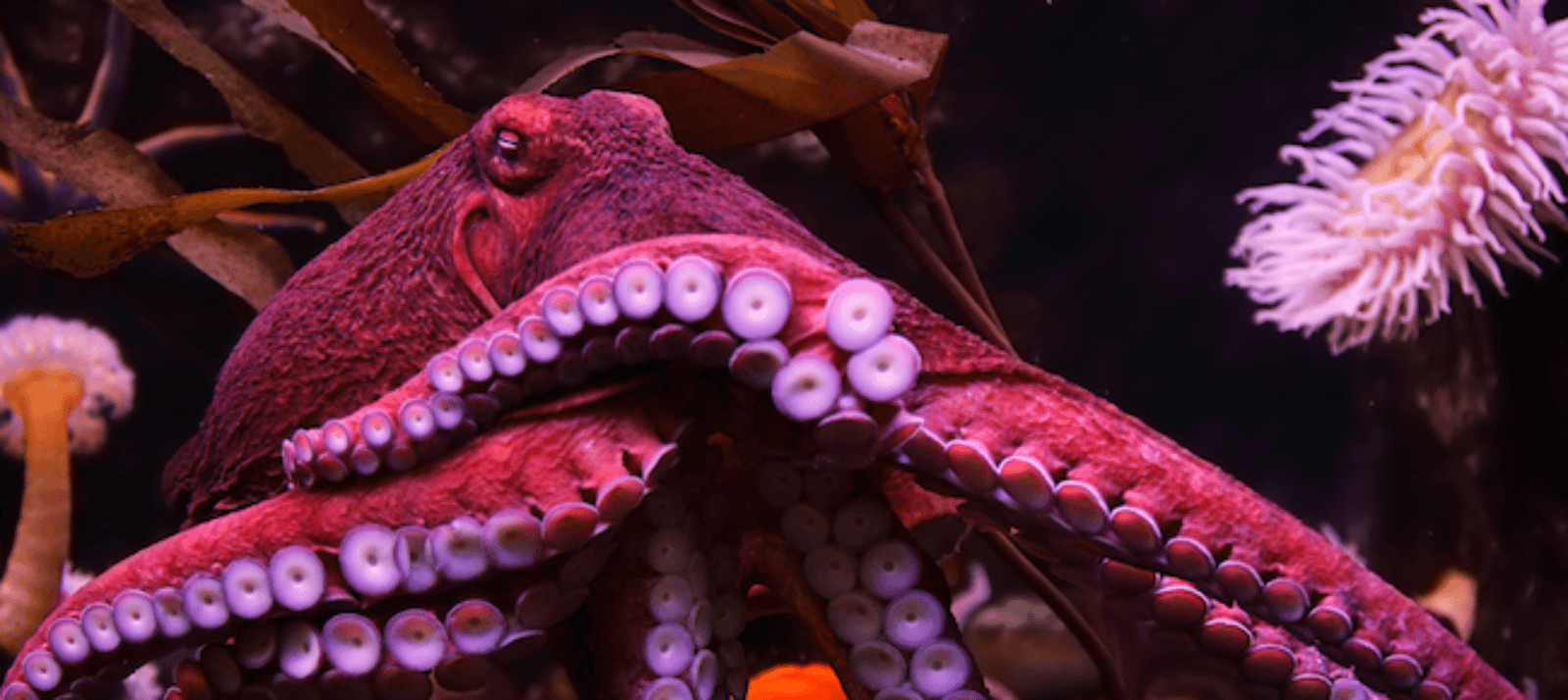Octopuses and Meditation
by Lindsay Borthwick
Research Highlights from Kavli Neuroscience Institutes

The Author
Recent advances in neuroscience span obesity to octopuses and targeted ultrasound to focused meditation. They demonstrate the power of new techniques that are allowing researchers to investigate the brain in new ways, and reveal advances in scientists’ efforts to understand and treat disorders such as Alzheimer’s and Parkinson’s and to improve our mental well-being.

A new discovery offers hope. A team of neuroscientists studying obesity in mice have identified neurons that control how much energy an organism expends. They are calling the discovery “a new horizon in obesity research” because those same cells may also control hunger. The neurons’ dual role raises the possibility of developing anti-obesity drugs that help control not only how much energy we take in by eating, but also how much energy we put out by producing heat, moving, and other means. A drug that suppresses the activity of these neurons would deliver a one-two punch: suppressing food intake and increasing energy expenditure at the same time. The research was led by Marc Schneeberger Pané, a postdoctoral Kavli Neural Systems Institute (Kavli NSI) fellow in the lab of Jeffrey Friedman at The Rockefeller University. Friedman was the founding co-director of Kavli NSI.
The blood brain barrier (BBB) fortifies the brain against bacteria and other pathogens, but it also prevents most drugs from entering brain tissue where they are needed most. Now, engineers at Columbia University have found a way to get Parkinson’s drugs across the BBB in mice to treat the neurodegenerative disease during its earliest stages. In a study that was partly funded by the Kavli Institute for Brain Science at Columbia, they combined transcranial, focused ultrasound with intravenously injected microbubbles to get drugs across the BBB, and found that the drugs improved neuronal function. The team, led by Elisa Konofagou, a professor of biomedical engineering, has received FDA approval to use the technique for clinical trials to test its safety in Alzheimer’s patients. They aim to work with Parkinson’s patients in the future.
Pietro De Camilli, director of the Kavli Institute for Neuroscience at Yale University, received the Ernst Jung Gold Medal for Medicine. The award, presented by the Jung Foundation for Science and Research in Germany, recognized his research illuminating how intracellular membranes—including neurotransmitters, the brain’s chemical signals—move within cells, and the role they play in maintaining brain health and in diseases such as Parkinson’s. “Some of the best moments for a scientist come when all of a sudden you can see how different elements of a puzzle are connected together and you find a solution to the puzzle,” says De Camilli in a video profile released in conjunction with the award.
KIN member Nenad Sestan was also honored in June with the Constance Lieber prize for innovation in developmental neuroscience.

MediTrain is a new personalized digital meditation training program, developed by neuroscientists at the University of California, San Francisco (UCSF), that improved attention and memory in healthy young adults in just six weeks, according to a new study. Its unique in using a “closed-loop algorithm” to adjust the length of the meditation sessions to match the abilities of the participants, preventing those who are new to meditation and mindful breathing from being discouraged. At the beginning of the 6-week, randomized, double-blind, placebo-controlled trial, participants were prompted to focus on their breath for just 10 to 15 seconds at a time. After 30 days of training, they could stay focused on their breath for an average of six minutes. The program’s considerable impact on attention and memory was unexpected but similar to the results of previous studies in adults, following intensive meditation training. Senior author, Adam Gazzaley, is executive director of Neuroscape at UCSF and a member of the Kavli Institute for Fundamental Neuroscience.
- Octopuses are making a splash… in brain research.
A recent headline about these eight-legged wonders read, “Researchers model how octopus arms make decisions.” That’s right. A group of neuroscientists modeling decision-making found that while humans and most other vertebrates, in which decisions are made in a top-down (or brain-first) manner, octopus decision-making is bottom-up (or arm-up). The study is just the latest in a string of discoveries in octopuses that are upending our understanding of the sea creatures—and ourselves. A few months ago, for example, Gul Dölen, a neuroscientist at Johns Hopkins University, where she is a member of the Kavli Neuroscience Discovery Institute, found an evolutionary link between social behavior in octopuses and humans. The octopuses she studied were from the Marine Biological Laboratory in Woods Hole, Massachusetts, which according to a new feature article in Hakai Magazine, is “busy developing the next great model organism for science.” Expect more tentacular, err, spectacular discoveries to come.